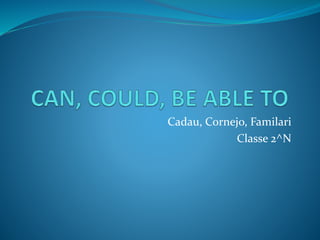
Can%2c could%2c be able to
- 2. CAN Can is an auxiliary verb, a modal auxiliary verb. We use can to: talk about possibility and ability make requests ask for or give permission Notice that: Can is invariable. There is only one form: can The main verb is always the bare infinitive.
- 3. can for possibility and ability We use can to talk about what is possible, what we are able or free to do: She can drive a car. John can speak Spanish. I cannot hear you. (I can't hear you.) Can you hear me? Normally, we use can for the present. But it is possible to use can when we make present decisions about future ability. Can you help me with my homework? (present) Sorry. I'm busy today. But I can help you tomorrow. (future)
- 4. can for requests and orders We often use can in a question to ask somebody to do something. This is not a real question - we do not really want to know if the person is able to do something, we want them to do it! The use of can in this way is informal (mainly between friends and family): Can you make a cup of coffee, please? Can you put the TV on? Can you come here a minute? Can you be quiet!
- 5. can for permission We sometimes use can to ask or give permission for something: Can I smoke in this room? You can't smoke here, but you can smoke in the garden
- 6. Structure of can The basic structure for can is: subject + auxiliary verb can + main verb The main verb is always the bare infinitive: SUBJECT CAN MAIN VERB + I can play tennis - He cannot play tennis can’t ? Can you play tennis
- 7. COULD Could is an auxiliary verb, a modal auxiliary verb. We use could to: talk about past possibility or ability make requests Notice that: Could is invariable. There is only one form: could The main verb is always the bare infinitive.
- 8. could for past possibility or ability We use could to talk about what was possible in the past, what we were able or free to do: I could swim when I was 5 years old. My grandmother could speak seven languages. When we arrived home, we could not open the door. (...couldn't open the door.) Could you understand what he was saying?
- 9. could for requests We often use could in a question to ask somebody to do something. The use of could in this way is fairly polite (formal): Could you tell me where the bank is, please? Could you send me a catalogue, please?
- 10. COULD OR BE ABLE TO? We use could (positive) and couldn't (negative) for general ability in the past. But when we talk about one special occasion in the past, we use be able to (positive) and couldn't (negative). Look at these examples: PAST GENERAL SPECIFIC OCCASION + My grandmother could speak spanish A man fell into the river yesterday. The police were able to save him - My grandmother couldn’t speak spanish A man fell into the river yesterday. The police couldn’t save him
- 11. Structure of could subject + auxiliary verb could + main verb The main verb is always the bare infinitive The basic structure of could is: SUBJECT COULD MAIN VERB + My grandmother could swim - She Couldn’t swim Could not ? Could your grandmother swim
- 12. BE ABLE TO Although we look at be able to here, it is not a modal verb. It is simply the verb be plus an adjective (able) followed by the infinitive. We look at be able to here because we sometimes use it instead of can and could. We use be able to: to talk about ability Notice that be able to is possible in all tenses, for example: I was able to drive... I will be able to drive... I have been able to drive... Notice too that be able to has an infinitive form: I would like to be able to speak Chinese.
- 13. be able to for ability We use be able to to express ability. "Able" is an adjective meaning: having the power, skill or means to do something. If we say "I am able to swim", it is like saying "I can swim". We sometimes use be able to instead of "can" or "could" for ability. Be able to is possible in all tenses - but "can" is possible only in the present and "could" is possible only in the past for ability. In addition, "can" and "could" have no infinitive form. So we use be able to when we want to use other tenses or the infinitive. Look at these examples: I have been able to swim since I was five. (present perfect) You will be able to speak perfect English very soon. (future simple) I would like to be able to fly an airplane. (infinitive)
- 14. Structure of be able to The basic structure for be able to is: subject + be + able + To infinite SUBJECT BE ABLE TO INFINITI VE + I am able To drive - She Is not able To drive Isn’t ? Are you able To drive